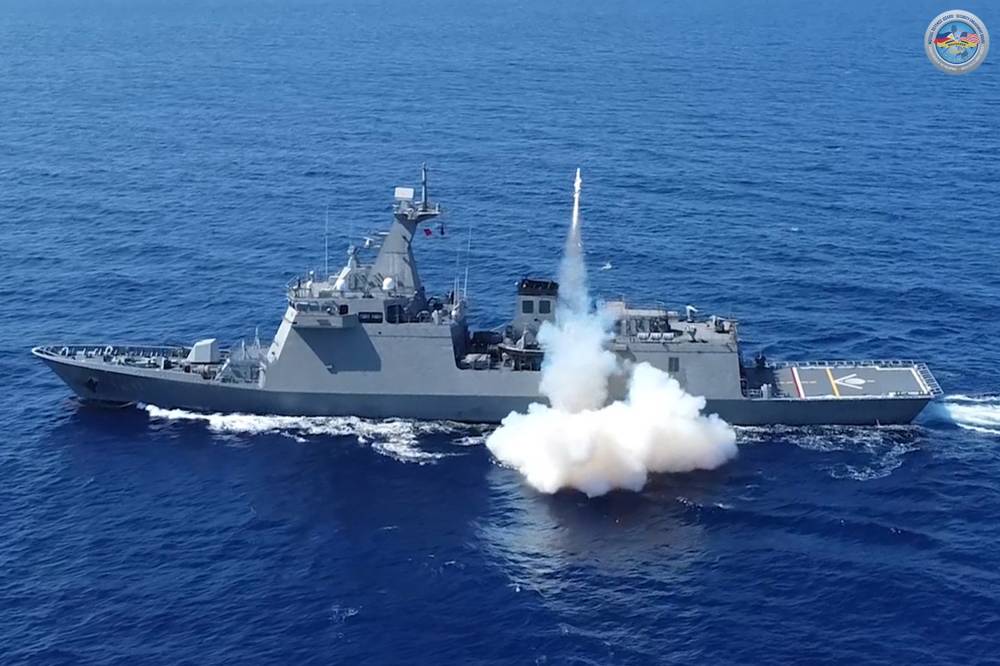US, PH troops sink China-made vessel in war games

MANILA—US and Philippine forces sank a decommissioned China-made Philippine Navy ship on Wednesday during South China Sea war games simulating an attack on an enemy vessel, officials said.
The exercises are being held near the city of Laoag, around 400 kilometers (250 miles) south of Taiwan, amid a backdrop of increased confrontations between Philippine and Chinese vessels around South China Sea features claimed by Manila and Beijing.
The BRP Lake Caliraya, a small tanker decommissioned by the Philippine Navy in 2020, slowly dipped below the water after being struck by waves of antiship missiles, rockets, cannon fire and land-based artillery off Laoag, they said.
A navy fast attack craft and frigate, an air force fighter and helicopter and land-based artillery from the Philippine military as well as a US F-16 fighter and an AC-130 gunship took part in the attack on the simulated enemy vessel, they added.
Repulsing an ‘aggressor’
The participants had “a mission of trying to prevent an aggressor from landing on the Philippine soil,” Lt. Col. Omar Al Assaf, lead Philippine planner for Wednesday’s activity, told reporters.
“The ability of both the US and the Filipino army and air force to work together to achieve this is extremely lethal,” said Lt. Col. Matt Cahill, commander of a US Army unit taking part in the war games.

He compared it to team sports in which “you don’t take the field with a new team, right before the big game” but must practice together beforehand.
The Philippine military earlier ruled out any symbolism in the choice of a China-made ship as target practice for the allies.
Imaginary invaders
“There is no issue with that. The vessel has been used in the Philippines for a long, long time. So any attachment, if ever there is, doesn’t matter at all,” said Philippine Navy chief Vice Adm. Toribio Adaci.
More than 16,700 Philippine and US troops are taking part in the annual military drills—dubbed “Balikatan,” or “shoulder to shoulder” in Tagalog—in multiple locations across the Asian archipelago.
Journalists watched Wednesday’s event on video screens beamed toward a strip of sand dunes where, two days earlier, the two allies had also conducted a live-fire exercise with missiles and artillery to stop an imaginary invasion force landing on the Philippines’ north coast.
Beijing claims almost the entire South China Sea despite an international ruling that its assertion has no legal basis. It deploys hundreds of coast guard, navy and other vessels to patrol and militarize the waters.
‘Clumsy political’ show
Asked about the drills, China’s foreign ministry warned on Monday that “any military exercise should not be targeted at or harm the interests of third parties.”
“Countries in the region can all see clearly who is currently provoking military confrontation and escalating tensions in the region,” spokesperson Lin Jian told a regular briefing.
The state-run Chinese Global Times said the BRP Lake Caliraya was “originally manufactured in China” and the only “Chinese-made naval asset” of the Philippines.
The media outfit called the sinking exercise “a clumsy political performance.”
Col. Francel Margareth Padilla, spokesperson for the Armed Forces of the Philippines, shrugged off the Global Times remark.
“It’s purely coincidental and it’s really not directed towards the source of such a vessel,” Padilla told reporters in Laoag City.
Commodore Roy Vincent Trinidad, the Philippine Navy spokesperson for the West Philippine Sea, also chimed in: “Whatever it is, no pun intended; there’s no (other) meaning to that. It’s just coincidental.” —Reports from AFP AND Nestor Corrales

















